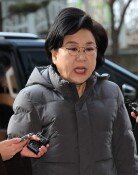Liquidity-driven Stock Rally Cause for Concern
Liquidity-driven Stock Rally Cause for Concern
Posted April. 13, 2009 08:58,
Many retail investors who lost the chance to snap up shares at bargain prices when the benchmark KOSPI index plunged below the 900 mark are at loss over whether to follow other investors and wait and see.
Investors are hesitant due to the unchecked rally of the Korean stock market driven by ample liquidity. The KOSPI has soared nearly 30 percent since early last month, and a string of equity-type funds have recorded monthly yields of more than 30 percent over that period. Debate is heating up whether the soaring stock market is normal amid a deep recession, and what strategy investors need during times like this.
○ KOSPI secures record gains in dollar terms
According to a survey of stock market trends by Samsung Securities released yesterday, the KOSPI rose 29.2 percent from March 2 to Friday, the biggest gain in the world after Russias RTS (50.34 percent) and Hong Kongs Hang Seng (31.35 percent). The Shanghai Composite Index, which has continued to rise since early this year, gained only 14.89 percent, while the Dow increased 23.47 percent.
If one compares changes in indexes among countries, the KOSPI is dwarfing its rivals in growth pace. Over the period, the KOSPIs gain translated into dollar terms reached 54.2 percent, the highest among major economies. As the won-dollar exchange rate has stabilized, the prices of Korean stocks denominated in dollars have all become more expensive to that extent. Foreign investors who brought in dollars and purchased Korean stocks have benefited from both the rising value of the won and soaring share prices.
As stock indexes soared, not a few equity-type funds have produced monthly yields of more than 30 percent over the past month. According to fund evaluator Zeroin, as many as five domestic equity funds recorded monthly yields of more than 30 percent as of Friday, including Samsung Securities Financial Powerhouse Korea Stock Conversion Investment 2 (37.08 percent). The fund yield was not as high as that in 2006, when the Korean fund market enjoyed an unprecedented boom.
The overheating of the stock market is also a fear given the expansion of trading value. The combined trading value of stocks on the KOSPI and the tech-heavy KOSDAQ exceeded 12 trillion won (9.02 billion U.S. dollars) Thursday and Friday, hitting a new high for this year. Samsung Securities said in a report, Considering past cases where corrections erupted when trading value topped 10 trillion won, the stock market appears to be overheating.
○ Investors advised to cash in gradually
Many experts have long predicted that the stock market will see at least one rally in the future. Countries have raced to cut interest rates and inject massive liquidity into the market to cope with the economic slump, while liquidity is flowing into the stock market amid the easing of the financial crunch, pushing up stock indexes. In addition, foreign investors who had nowhere else to invest began buying Korean stocks that are relatively sound in droves, generating a liquidity-driven stock rally that has come earlier than expected.
According to the Korea Financial Investment Association, investor deposits in securities companies reached 15.4 trillion won (11.6 billion dollars) as of Thursday, up nearly six trillion won (4.5 billion dollars) from late last year.
Lee Jong-woo, head of the research center at HMC Investment and Securities, said, A time will come when the pace of decline in economic indicators will slow, and I think this is the time, adding, The market is experiencing a liquidity-driven rally, in which ample money pushes up share prices.
Stock prices have gained due to expectations for recovery in the real economy, as financial institutions have shown signs of improving performance while certain economic indicators, including U.S. consumer spending and housing sales, are rebounding. Experts concur, however, that the stock rally is an obvious overshooting, saying stocks cannot continue to rally amid the economic slump and so investors must cash in gradually and take profits.
Kim Hak-kyun, a researcher at Korea Investment and Securities, said, Stock indexes appear to be hovering at the top of a band, and share prices are hardly cheap when considering the profitability of companies.
"Investors who lost a chance to invest before the recent rally are advised not to jump into the market belatedly, and instead wait to invest when stocks undergo a correction.
jarrett@donga.com baltika7@donga.com







